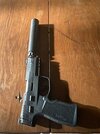Welcome to THR.

From ATF -
https://www.atf.gov/firearms/docs/t...earms-act-firearms-decedents-estates/download
For registered NFA firearms in the estate, the executor should take action as soon as possible to arrange for the proper registration of the firearms ... we do allow the executor a reasonable time to arrange for the transfer of the registered firearms in a decedent’s estate. This generally should be done before probate is closed.
It is the responsibility of the executor of the estate to maintain custody and control of the firearms and to transfer the firearms registered to the decedent ... The firearms may be transferred on a tax-exempt basis to a lawful heir. The executor would apply on ATF Form 5, Application for Tax Exempt Transfer and Registration of a Firearm, for a tax-exempt transfer to a lawful heir.
A lawful heir is anyone named in the decedent’s will or, in the absence of a will, anyone entitled to inherit under the laws of the State in which the decedent last resided. NFA firearms may be transferred directly interstate to a beneficiary of the estate. When a firearm is being transferred to an individual heir, his or her fingerprints on FBI Forms FD-258 must accompany the transfer application. However, if any Federal, State or local law prohibits the heir from receiving or possessing the firearm, ATF will not approve the application.
ATF Form 4 is used to apply for the tax paid transfer of a serviceable NFA firearm to a person outside the estate (not a beneficiary). ATF Form 5 is also used to apply for the tax-exempt transfer of an unserviceable NFA firearm to a person outside the estate. As noted above, all requirements, such as fingerprint cards for transfers to individuals and compliance with State or local law, must be met before an application may be approved ...


